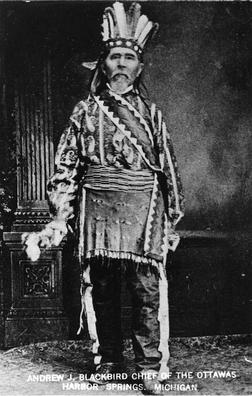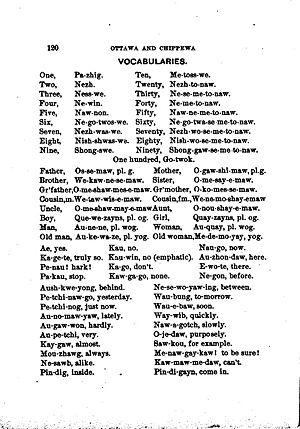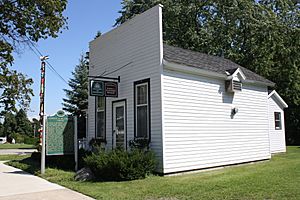Andrew Blackbird facts for kids
Quick facts for kids
Andrew Blackbird
|
|
|---|---|
 |
|
| Born | January 1814 (or 1815 possibly later) Harbor Springs, Michigan, U.S.
|
| Died | September 1908 Harbor Springs, Michigan, U.S.
|
| Nationality | American |
| Occupation | Ottawa Chief, Author, Interpreter |
| Known for | Chief of the Ottawa, Politics, published History of the Ottawa and Chippewa Indians of Michigan |
Andrew Jackson Blackbird (around 1814 – 17 September 1908) was an Odawa (Ottawa) tribe leader and historian. He was also known as Makade-binesi, which means "Black Hawk". He wrote an important book in 1887 called History of the Ottawa and Chippewa Indians of Michigan.
Contents
Early Life of Andrew Blackbird
Andrew Blackbird was born in the L'Arbre Croche area of Michigan. This place is now known as Harbor Springs, Michigan. He was born around 1815, though some say it might have been as late as 1821.
His father was also an Ottawa leader named Makade-binesi, or "Black Hawk." The name was later changed to "Blackbird" in English. Andrew's father was once left alone on an island by traders. This unfair act deeply affected young Andrew.
Andrew Blackbird often felt his formal schooling was limited. However, he had a strong education in traditional Ottawa culture. He learned many important practices from his father, who was a chief.
Andrew was baptized as a Roman Catholic in 1825. Later, he became a Protestant. He worked as an interpreter at the Protestant mission in L'Arbre Croche. Even as a Christian, he knew a lot about the traditional Ottawa religious beliefs.
Blackbird learned to be a blacksmith at mission schools. He studied for four years at Twinsburg Institute in Twinsburg, Ohio. He had to leave before finishing to help his elderly father. Later, he attended Eastern Michigan University for two years but also did not graduate. He wanted to learn English perfectly to help his people. He even started writing a grammar book for the Indian language.
Andrew Blackbird's Rise to Recognition
Andrew Blackbird was very loyal to the United States. In 1858, he married Elizabeth Margaret Fish, who was a white woman. This helped him gain favor with the United States government.
By the 1850s, Blackbird became an important advisor. He helped both the United States government and the Ottawa and Ojibwa peoples. He worked to help Native American veterans get their pensions. He also helped settle land claims. Blackbird strongly believed that Ottawa and other Native Americans should become citizens.
He served as an interpreter and witness when the "Treaty With The Ottawa and Chippewa" was signed. This important treaty happened on July 31, 1855.
In 1858, Blackbird bought a house in Harbor Springs, Michigan. He lived there permanently. At that time, many Ottawa people still lived in Harbor Springs. Blackbird became the town's postmaster. His friend, Senator Thomas Ferry, helped him get this job.
His Book: History of the Ottawa and Chippewa Indians of Michigan
In 1887, Andrew Blackbird published his famous book. It was called History of the Ottawa and Chippewa Indians of Michigan. This book was one of the first reliable accounts of the Ottawa and Ojibwa (Chippewa) peoples.
The book shares not only historical facts but also daily life details. It describes how the Ottawa and Ojibwa hunted, fished, and trapped long ago. Blackbird also explains many of their traditional beliefs and cultural practices. Since the author was a Native American himself, the book offers a true perspective. It does not have the biases often found in books written by white authors of that time.
The book also includes a basic grammar guide for the Ottawa and Ojibwa languages.
Andrew Blackbird's Views on Fairness
Andrew Blackbird spoke out about the unfair treatment Native Americans faced. In a publication from 1900, he shared his concerns. He explained that many white people had negative views about Native Americans. These harmful ideas spread widely.
He noted that these negative ideas caused prejudice against Native Americans. This meant they often faced unfairness and were treated poorly. Blackbird believed that Native Americans deserved peace and justice. He wanted them to be safe from being cheated or robbed of their lands. He worked hard to show the challenges his people faced.
Andrew J. Blackbird House
The Andrew J. Blackbird House is in Harbor Springs, Michigan. Today, it is a museum filled with American Indian artifacts. These items are displayed in the very house where Blackbird lived from 1858 until his death in 1908. There is a Michigan State Historical Marker at the site. The house itself is also listed on the National Register of Historic Places.
Images for kids






